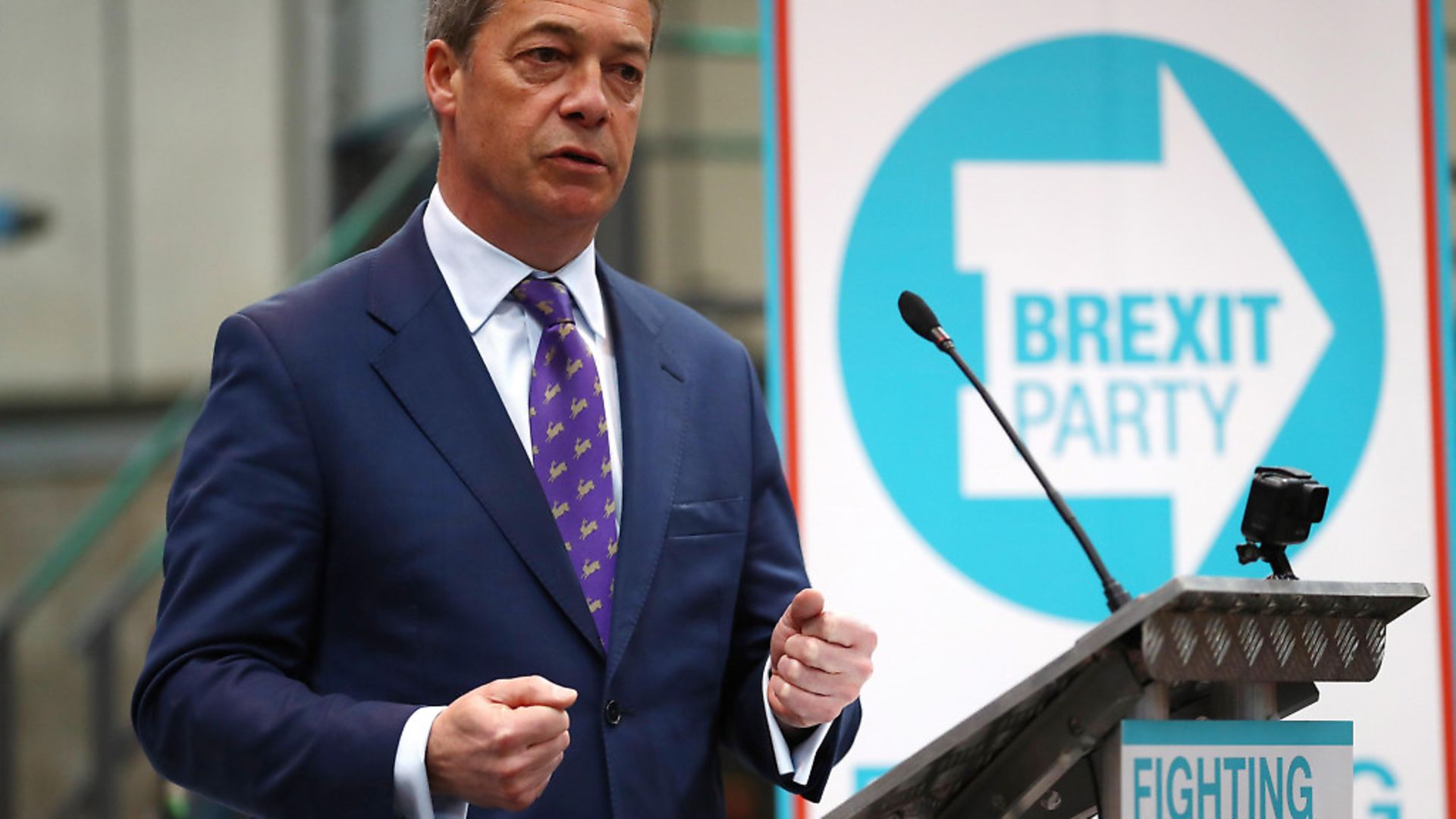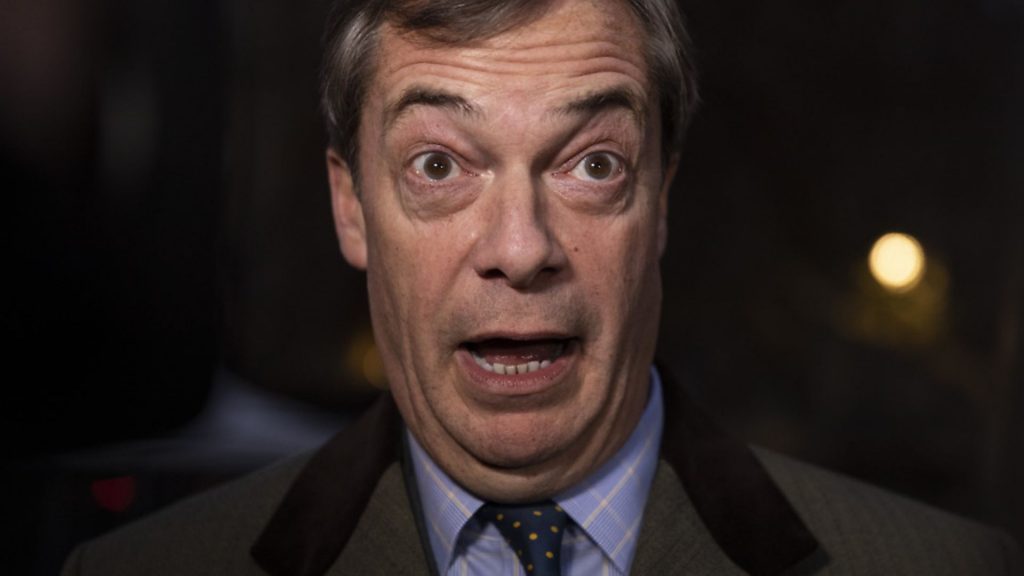
ZOE WILLIAMS discusses the consequences of Nigel Farage’s influence on Brexit and how it has affected the political climate.

I was informally canvassing my neighbour: not on behalf of a political party, I just wanted to know how he was voting. “The Brexit Party,” he replied.
My face scrunched involuntarily. “You’re a herbalist. You once smoked a joint so strong in the garden that I got stoned from my bathroom. Never mind that nearly half that party would say you’re not truly British. A poll this month found most Leavers say it’s important that both your parents were born in Britain to be truly British – which as we both know is code for ‘not white’. What part of Nigel Farage’s saloon bar patter actually appeals to you?”
“Look, at least he knows what he stands for.”
But what does Farage actually stand for? We know where he stands on Brexit, while simultaneously, we have no idea. Right now he wants ‘no deal’. In the UKIP manifesto of 2015, the party promised “continued access on free-trade terms to the EU’s single market” as well as membership of pan-European institutions such as the European Space Agency and the European Medicines Agency. That is not a no-deal Brexit by anyone’s lights; functionally, it’s full single-market alignment, an even softer Brexit than the doomed customs union-only option currently being discussed by Labour and the Conservatives.
Factoring in his other flirtations (with a Norway or Switzerland model, on Question Time and many other current affairs shows, before the referendum: “They’re rich, they’re happy, they’re self-governing”), it is impossible to divine any through line to his plan for a relationship with Europe.
Never mind, how can we tell what people voted for in 2016 – when only one Leaver in five even thought it meant leaving the single market – we cannot even tell what its central advocate was voting for. I raise this not because there is anyone left who doesn’t know it – I would love to put past chagrin behind me – but because it is impossible to extrapolate what his view will be in the future.
It is, unarguably, chaotic and dangerous to vote for a party which will not commit itself to any policies, in Europe or beyond. Yet arguably, it wouldn’t matter even if the Brexit Party did commit, being led by a man without consistency, accountability or veracity. He could say anything at any time, and later say the opposite. We talk a lot about Nineteen Eighty-Four, but actually we’re living in Animal Farm. Nineteen Eighty-Four is what happens next.
So where does he stand on everything else? I first met Farage soon after his plane crash in 2010. It was on Pienaar’s Politics, and all anyone could talk about was what a lovely bloke he was. As strange as it is to recall, at that point he wasn’t a particularly controversial figure: a Eurosceptic, of course, but UKIP’s campaigns were fought on insinuation and a hostility to the EU so vivid yet generalised that you couldn’t pin much on it. “Huh. That man really hates Herman Van Rompuy.” What are you supposed to make of that?
It is interesting, in retrospect, to think how many of his views were hiding in plain sight: it wasn’t until 2013 that he stood up in the European parliament to decry climate change action as one of the “biggest, stupidest collective mistakes in history”, yet in 2008, he pointedly sat all the way through a standing ovation given to Prince Charles, in the same spot, who had called for EU leadership in the battle to save the environment.
Farage called the prince’s advisors “naive and foolish at best”, which has only one meaning: climate change is a myth. But perhaps because it didn’t seem to matter very much what his splenetic and peacocking take was on matters of science, it still came as a shock when he came out with it more bluntly five years later. (The Prince Charles incident recalls another mistake the left has always made with Farage, besides not really noticing him until too late: Gary Titley, then leader of the Labour MEPs, called him disloyal and discourteous to the royal family. We always think it’s clever to attack him on his own turf – patriotism, royalism, tradition – but the fact is, his side doesn’t care what we think, and our side doesn’t care that much about Prince Charles. Though I hope we wouldn’t be rude to him.)
Anyway, between 2010 and 2016, Farage skirted this line: extreme clubbability in mainstream British media, vivid far-right grandstanding at private dinners and in the European parliament, which would then be clipped and enjoyed in Facebook’s dank spaces, where people go to complain that they didn’t hear any English spoken on their train.
Even by 2015, when he was publishing one of his surprisingly numerous autobiographies, all attention was on his likeable, blokey eye for detail: The Purple Revolution, which is explicitly anti-NHS and implicitly racist, was nevertheless still reviewed mainly for the fact that, when suffering from cancer, his testicle was once the size of a lemon.
This anti-NHS stance – he believes that we should move to an insurance model, instead of “trustingly giving £100 billion a year to central government” – is now well known. When you look at his rallies and think how very reliant its attendees are on universal free healthcare – not to beat about the bush, they are not a young crowd – it is astonishing that he manages to get his radical free-market fundamentalism past them, on such a life-altering and also emotional issue as the NHS.
Yet his victim-outsider self-fashioning is so pronounced that criticism rarely lands. The interview on The Andrew Marr Show last Sunday was the most explicit illustration of what has always been the implicit tactic: any question that involved consecutive thoughts building to a reasoned conclusion (“if you thought x then, does it follow that you still think it now?”) was met with an accusation of bullying or exclusion.
He’s almost ad-hominem-ed himself; diverted attention from the ball by making himself the man, then pretending to have been fouled and rolling around on the floor howling over an imaginary hurt. I think he actually learnt his politics not from great authoritarians of history but from Premier League football. But we don’t really have time now to trace its roots.
Denying climate change, wanting to privatise medicine; we can pretty much guess the rest, although we don’t have to: he’s a pay-gap truther (women are paid less because of “lifestyle choices”); he’s against employees’ rights and protections; against international aid; he’s xenophobic in ways that seem alternately instrumental and heartfelt.
So the famous “Breaking Point” poster did not, one surmises, represent a sincerely held fear of Farage’s: he knew better than anyone that the picture had nothing to do with British borders. But his remarks about Muslims (he doesn’t mind some of them, he minds the ones that want to take us over), and about foreigners generally (he seems sincerely troubled by hearing foreign voices) do seem to indicate that some of his xenophobia, at least, is authentic.
It wasn’t all tactics that got him past the mainstream hygiene factor that once protected the public sphere from figures who outright denied science, reason and observable fact. It was also money.
The Brexit Party’s original £750,000 was claimed to be one £100,000 donation from a source they would not name, the rest from small individual donations, as people rushed to join for £25 each. This is impossible to check. You can register without paying £25. The small payments are all run through PayPal US and are anonymous.
It could be from individual donors, but equally, it could be from anywhere (the Robert Mueller investigation found that Russian trolls used Paypal US to significant effect, sowing chaos in the 2016 US election).
The Leave.EU campaign – which Farage fronted – meanwhile, was bankrolled overwhelmingly by Aaron Banks, to the tune of £8 million, the largest single donation in British political history; some questions have been answered – whether Leave.EU met with the Russian Embassy (yes); whether electoral law was broken (yes) – and others haven’t (where did the money actually come from?).
The campaign had uncostable help-in-kind from Robert Mercer, the US hedge fund billionaire and backer of Breitbart – hard to put a finger on how much it was worth, since it is as yet impossible to quantify the value of data harvesting from Facebook; also, because nobody within Leave.EU has been transparent about the extent of it.
Farage, meanwhile, has been the subject of numerous EU corruption investigations, one for using EU funds for his anti-EU tour of 2014, several for using EU-paid staff to double up as UKIP staff (MEPs’ staff are explicitly banned from working for national political parties); one for employing his (now estranged) wife in his office for the national party, while she was simultaneously working for an MEP, for whom the Commission was unconvinced that she was doing any real work.
Farage amassed some personal wealth from his career in the City, yet his claim, in January, that he chartered a private plane himself to get from London to Strasbourg was rendered dubious when, having been asked about it by the journalist Matt Frei, he declared afterwards that an anonymous businessman had stepped forward to reimburse him. Who pays for his speeches in the States? How come he has a driver (who crashes into things)?
There is, shall we say, a lack of transparency around his affairs that is deeply incongruous in a public servant, but consonant with his modus operandi, as evidenced by his time as MEP.
Above all else, it’s the impunity that should worry us: what he renders tolerable, in politics and in society, by enacting it with apparently no consequence but crowd-pleasing.
His views become more extreme – he recently made one of his rare appearances in the European parliament to deliver a short paean to Victor Orban – as the mud slides off him. It is a tragedy that someone whose character is so low should bring the stakes so high.










